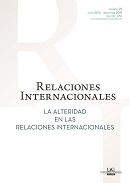Palabras clave:
Alteridad, apropiación local, resiliencia, Gobernanza, consolidación de la pazDerechos de autor 2015 Pol BARGUÉS-PEDRENY

Esta obra está bajo una licencia internacional Creative Commons Atribución-NoComercial-SinDerivadas 4.0.
Resumen
Este artículo quiere entender la evolución de los procesos de consolidación de la paz en los últimos años, a través del análisis de cómo la conceptualización de la alteridad por parte de los organismos internacionales está cambiando. El argumento es que en las intervenciones posbélicas de la década de los noventa y de los primeros años del siglo XXI, los procesos intersubjetivos de las sociedades que salían del conflicto se consideraban un problema a corregir con la creación de instituciones eficientes supervisadas por expertos internacionales. Sin embargo, con la pérdida de confianza en la posibilidad de promover la democracia internacionalmente y con la voluntad de solventar los errores de unas intervenciones excesivamente intrusivas, la alteridad es cada vez más un recurso que puede utilizarse para desarrollar una paz respetuosa con el contexto de cada sociedad. Para analizar cómo la alteridad se ha entendido más positivamente en los últimos años, algo transcendental para explicar cómo organizaciones internacionales entienden la paz actualmente, el artículo se centra en los conceptos de “apropiación local” y “resiliencia”. La conclusión es que este cambio positivo para respetar otras culturas también esconde dos potenciales problemas. El primero es que estamos perdiendo la capacidad para teorizar sobre la paz y el segundo es que la autonomía o soberanía nacional de las sociedades posbélicas continua en el limbo.





